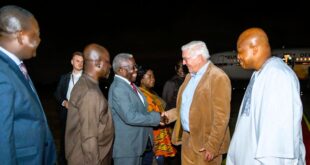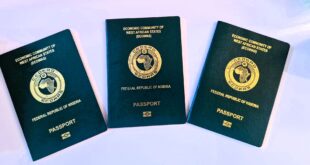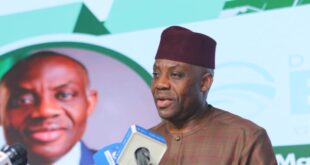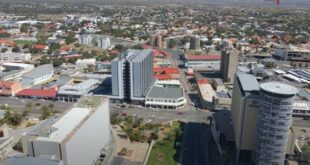Nigeria is currently undergoing a serious crisis as nomadic Fulani pastoralists seek to establish permanent settlements all over the country by violently dispossessing the original inhabitants of their land through ethnic cleansing. Since 2014, thousands of rural dwellers, especially farmers and their families, have been killed by the rampaging herdsmen, while hundreds of thousands have been driven off their land.
Critics of government’s inability to stop the carnage accuse President Muhammadu Buhari of passively supporting his kinsmen as he is Fulani himself. While ethnic nationality groups in the affected areas of central and southern Nigeria are daily crying out over the killing of their people and attempts to take their land, Professor Jason Osai* in this piece recommends a passive weapon the people could deploy to save their lives and land.
In March 2016, the people of Egbema in Ogba/Egbema/Ndoni Local Government (ONELGA), Rivers State and their friends from near, far and wide converged at home for the burial of Mrs. Ule Samade who was sexually assaulted and fatally shot on her farm by Fulani herdsmen.
The death of the very vivacious and homely Ule in her prime was a bitter and painful loss made more so by the peculiar circumstance of her death and the fact that every effort to bring the assailants to book failed due to the status of the owner of the herds in the security apparatus of Nigeria.
Nursing its deep emotional wounds, the family decided not to serve beef at the burial and took a traditional oath never to cook or eat beef in the family throughout the life of the current adult members. So it was that fish and chicken were served as protein at the burial, a rather eloquent protest albeit a passive one. So, for the occasion, the principals of the herdsmen lost clientele, no matter how comparatively infinitesimal.
Fast forward, on Saturday, June 29 2019, the people of Nenwe Community, Enugu State chased a herd of cattle and their AK47-totting herders out of the community and expressed the desire to collectively abstain from beef. Now, if a leaf is borrowed from the apparently paltry passive protest of the Samade family, the threat of the Nenwe Community and the underlining consciousness that manifested in these acts of resistance is effectively tapped into and propagated widely, it will constitute a trickle into the ocean of withholding demand for beef.
The law of demand and supply teaches that where demand is nonexistent, supply seizes to be; in other words, if there is no demand, the entrepreneur has no need to process his commodity and transport it to a nonexistent marketplace and if this persists over an extended timeframe the entrepreneur is, inevitably, out of that particular business.

Within the context of the above economic truism, it is wondered why demand cannot be utilized as a weapon against the menace of Fulani herdsmen. After all, nutritionists counsel against eating beef as a result of its cholesterol content; environmentalists inform that it takes fifty thousand litres of drinking water to make one kilo of beef and that cutting meat by only 10% will feed one hundred million people while vegetarians argue that eliminating it from our tables will end starvation forever.
Currently, there is a global campaign against the consumption of beef based on the argument that it takes enormous amount of water and degradation of the environment to produce beef meanwhile man is running out of water and may go to war in the near future for table water as the aquifers are drying up.
That the Fulani customarily do not consume beef means that they may have been aware of the health hazards from time immemorial. So, for the rest of Nigerians, it is lose-lose situation: beef, arrow or bullet, either way, Nigerians are being killed in their thousands in keeping with the grand design of Islamizing the country. Obviously, the sustainability of the trade, economy and livelihood of the Fulani primarily depends on demand from people south of their territory.
In a 1995 poem titled “Niger Delta Donkey,” which is part of a thirty-poem anthology published in 2002, a poet observed and prophesied thus inter alia:
See the herdsman
His holy book in han’
He’s jihading to thy sea
Always where and what he wants to be
From pre-Boro
To post Saro
You aborrowed
And asorrowed
While their serfs on your horses
Cart away their loot
From your land and purses
As your princes are on foot
If you close your eyes
And bow your head
Persistent would be their actions and lies
Until you are dead
In the first three lines, “Niger Delta Donkey” alludes to the statement credited to Sir Ahmadu Bello to the effect that the Koran will be dipped in the Atlantic Ocean, thus Islamizing all of Nigeria as intended by Uthman Dan Fodio. The fourth line refers to the audacious manner in which Northerners take positions in the system without caring whose ox is gored; this is exemplified by the facts that (1) Hausa/Fulanis are the major beneficiaries of the allocation of oil wells and (2) the current appointment of Fulani Moslems into virtually every major national security office and other high profile positions. The eight-line second verse captures the existence of abject poverty amidst plenty and the systemic oppression of the people of Niger Delta.
More than two decades after the twenty-eight-line “Niger Delta Donkey,” the poet captured the same theme in another metaphoric poetry titled “Sitting Ducks” in which he wrote thus inter alia:
From around the Sahel they’ve arrived
Full, fiendish, fanatical freaks
Plying trades on which your forebears thrived
And taking over your creeks
Your farmland are trampled by their herd
Your protestations can’t be heard
Sitting ducks, waiting to stop the poisoned arrow
Shot from the full freaking fanatics’ bow
As you live in silent desperation
While they have no hesitation
To unleash the deadly staccato of their AK47
Towards voluptuous rewards in heaven
(The Tide, June 28, 2019:9)
Interestingly, in “Niger Delta Donkey,” the author was historical and at the same time futuristic; however, in “Sitting Ducks,” he addresses the cogency, currency and urgency of now. He utilizes the metaphor of ducks helplessly and unconsciously sitting at “bull’s eye” of the herdsman’s bow and arrow or the globally acclaimed deadly AK47 assault rifle thus emphasizing the fatality and finality of the situation.
Taken together, both poems constitute a wake-up call for a very generous and highly gifted people who are, rather unfortunately and shamefully, known for their divisiveness and docility.
With the Federal government cancelling gun licenses and withdrawing all licensed guns while herdsmen ply their trade with AK47 brazenly and arrogantly hoisted on their shoulders, the vulnerability of the citizens of the Middle Belt and the rest of the South of Nigeria cannot be overstated. Under the circumstance, adjusting the taste buds and withholding the demand for beef will, if affected widely and committedly, pull the entrepreneurial rug off the feet of the principals of the herdsmen.
Speaking in this vein, Emeka Anyaegbu rhetorically asked thus: is it not high time we boycotted cow meat? Is it not ironic that while they slaughter us we still spend more than N5b per annum patronizing them? Ponder the essence and import of these questions vis-à-vis the number of cows bought during festive periods, the new fad of royal-standard weddings, insane burial carnivals, traditional wine carrying, thanksgiving services and opening of houses, offices etc not to mention daily patronage for domestic and commercial purposes.
Certainly, the purchase of beef inadvertently strengthens the principals of the herdsmen; therefore, the proposed boycott is a very eloquent way of telling the Fulani that we can do without their commodity. All that needs be done is to join the Fulani in abstinence from the commodity of their enterprise and the demand for beef will plummet and the whole hoopla about RUGA and cattle ranches will come to a quiet and peaceful end.
In view of the above, it behoves the governments of the States affected by this menace and NGOs with a proclivity for human rights to embark on extensive public enlightenment campaign to sensitize the people to align with Samade family of Egbema (not necessarily to the extent of the traditional oath) and the intended action of Nenwe Community. Perhaps, this will force the principals of the herdsmen to a roundtable towards peaceful coexistence. Particularly speaking, the people of Niger Delta have been the donkeys of the Nigerian society over the years; their docility has now translated to living the essence of “Sitting Ducks” invariably waiting for the herdsman’s bow and arrow or the staccato of his deadly AK47.
What is very irksome in this whole affair is that humanity is racing into the future at breakneck speed, Artificial Intelligence (AI) is displacing man in the workplace, oil has lost its primacy in the global marketplace, John Magufuli has put Tanzania on the wheels of progress and Paul Kagame has attracted Volkswagen to establish an assembly plant in Rwanda; meanwhile, Nigeria is feverishly driving blindly on the reverse by being neurotically preoccupied with mundane things such as land, cattle, ethnicity and the preposterous and idiotic matter of searching for the face of the Unknowable through the jaded and ossified creeds of two alien religions called Christianity and Islam; what a pity, what a great pity for a country so richly endowed with globally acknowledged abundance in human and material resources.
The Fulanis are predators of the first order with the patience of a vulture; the suspension of the RUGA program should be seen for what it is, suspension, not cancellation. The recent withdrawal order is just a tactical strategy to retreat (not surrender) and reorganize for the next line of action. This issue will certainly resurface in the future in a more daring and audacious manner if something decisive is not done. With a resolve to change our taste buds and abstain from beef, the multibillion Naira herder enterprise will crumble.
In the history of communications, it is said that nothing arrests the mind more permanently than words captured in music or poetry; so, the reader is humbly invited to ponder the following fourteen-line poem as a parting gift:
Demand as Weapon
Bow and arrow have we not,
Against the lethality
Of the staccato of AK47
We can’t get even;
But we owe posterity
Protection from hurt
So, if one and all,
We reject beef
The butcher’s stand
Will surely fall
Without a miff.
Then we’d cultivate our land
And peacefully savour the bounty
Of the Almighty
Every human being has ears; however, for some, their ears are ornamental hence the Man from Galilee said thus: “He that hath ears to hear, let him hear.” Egwerio!
* Prof. Jason Osai is a professor of Development Studies and Head, Department of Political Science, Faculty of Social Sciences, Rivers State University, Port Harcourt, Nigeria.
 THE AFRICAN COURIER. Reporting Africa and its Diaspora! The African Courier is an international magazine published in Germany to report on Africa and the Diaspora African experience. The first issue of the bimonthly magazine appeared on the newsstands on 15 February 1998. The African Courier is a communication forum for European-African political, economic and cultural exchanges, and a voice for Africa in Europe.
THE AFRICAN COURIER. Reporting Africa and its Diaspora! The African Courier is an international magazine published in Germany to report on Africa and the Diaspora African experience. The first issue of the bimonthly magazine appeared on the newsstands on 15 February 1998. The African Courier is a communication forum for European-African political, economic and cultural exchanges, and a voice for Africa in Europe.

































